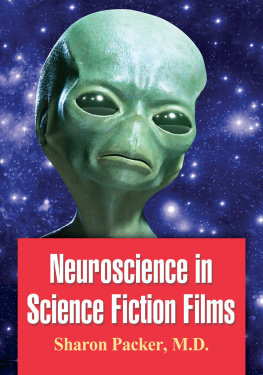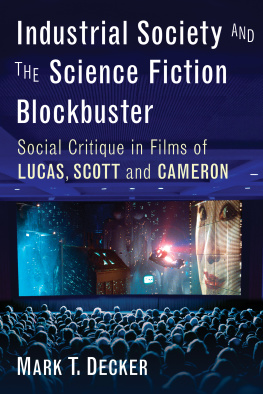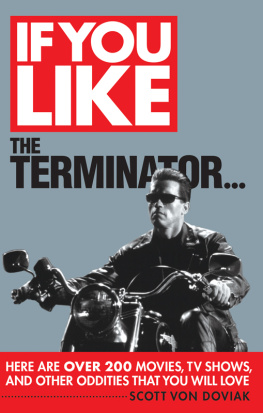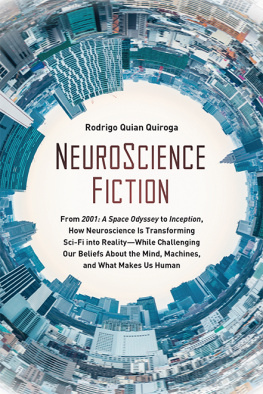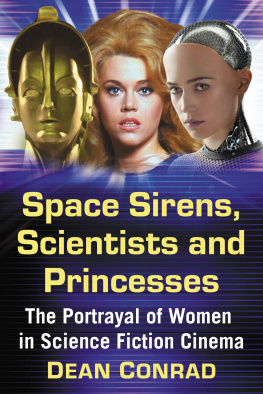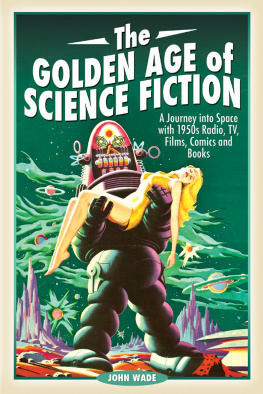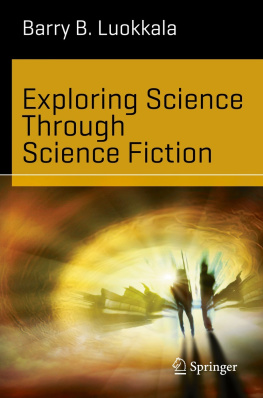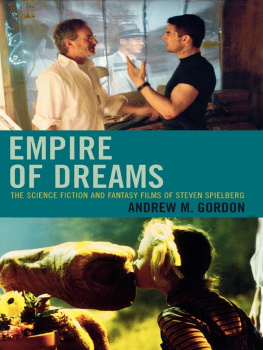
Also by SHARON PACKER, M.D.
Cinemas Sinister Psychiatrists:
From Caligari to Hannibal (McFarland, 2012)
Neuroscience in Science Fiction Films
Sharon Packer, M.D.

McFarland & Company, Inc., Publishers
Jefferson, North Carolina
LIBRARY OF CONGRESS CATALOGUING DATA ARE AVAILABLE
BRITISH LIBRARY CATALOGUING DATA ARE AVAILABLE
e-ISBN: 978-1-4766-1800-5
2015 Sharon Packer, M.D. All rights reserved
No part of this book may be reproduced or transmitted in any form or by any means, electronic or mechanical, including photocopying or recording, or by any information storage and retrieval system, without permission in writing from the publisher.
Cover images Shutterstock
McFarland & Company, Inc., Publishers
Box 611, Jefferson, North Carolina 28640
www.mcfarlandpub.com
In Honor of Joel L. Steinberg, M.D.
Acknowledgments
This book would not have been possible were it not for the help of several essential people.
Most of all, I thank George Chaim Higham for his endless efforts and for his willingness to celebrate our 25th anniversary by poring over photos from SF texts. I must also thank many old friends from medical school, especially (in alphabetical order) Steve Berman, M.D., Ph.D., Richard Cumberlin, M.D., and Joel Steinberg, M.D., for sparking my interest in the crossover between SF, real science and philosophy, and for alerting me to the artwork that joins the fields.
Insights and inspirations come from many people, including (in alphabetical order) Michael Ascher, M.D., Mark Banschick, M.D., Steven Billick, M.D., J.P. Chen, M.D., Ph.D., Bennett Cohen, M.D., Jake Coyle of AP Press, Danny Fingeroth, Ian Fischer, MFA, Howard Forman, M.D., Roland Holt, M.D., Richard McCarrick, M.D., Phil Miller, Ph.D., MLS, Ed Morman, Ph.D., MLS, Jody Pennington, Ph.D., Merle Robinson, M.D., Joan Root, MFA, MA, Robert Rubin, M.D., Ph.D., Michael Schwartz, M.D., John Strausbaugh, John Sweeney, Ph.D., and Fuat Ulus, M.D. Thanks also to Robert Ruben, M.D., and Donna Fingerhut of the New York Academy of Medicines History of Medicine Section, Film Forum curators, Anthology Film Archives library staff, and Elliott Kanbar of Quad Cinema. My special thanks to Beth Israels chair of psychiatry, Arnold Winston, M.D., Albert Einstein College of Medicines dean, Alan Segal, M.D., Joan Lippert and Karen Sorensen of AECOM library and magazine, Dr. George Makaris History of Psychiatry section at Cornell-Weill, Christian Perring of Metapsychology, Natalie Timoshin, Laurie Martin and James Kroll IV, M.D., of Psychiatric Times, Gina Henderson of Clinical Psychiatry News, and Ben Green, M.D., of History of Medicine. Jim Carlsons tech support is essential and Dr. JP Greens spirit always inspires.
Preface
Chances are, we all have heard the story about the three blind men and the elephant (which sometimes is the six blind men and the elephant). One man touches the elephants tusk, another puts his hand on the trunk, and the third wraps his fingers (partly) around a round and sturdy leg. In some versions, one man grabs the tail while another traces the length of the nose.
Each man describes something very different, based on his own experiences. Each is correct in his own way, but each answer is only partly correct overall. When a sighted man passes by, and describes the elephant as a whole animal, his words paint a completely different picture. Only then do the blind men realize that they are blind and that they are unable to perceive the whole elephantor the whole truth.
That ancient Indian story is very apropos to this topic of neuroscience in science fiction films. For this is an elephant of a topic, one that would be tackled very differently by authors with different training and different persuasions. The film critic, the historian of science, the philosopher, the SF fan, the student of science fiction literature (as opposed to SF cinema) will each broach this vast subject in his or her own way.
Neurologists or neurosurgeons will view these SF films through a different lens than one a practicing psychiatrist. Dedicated psychoanalysts will have their own opinions. I expect that a bench neuroscientist, who experiments in laboratories without treating patients, will have a special perspective, as would a bioengineer, who has more data about mechanical operations and physics. And so on and so forth. Many different fields can lay claim to this subject matter, from philosophers to film scholars to historians of behavioral science. Representatives from each field are needed to appreciate the totality of the topic.
Given how much ones academic background influences ones approach to this subject, I must tell my readers about my own training (and about the training that I do not have). Let me start by saying that I am a physician who specializes in psychiatric medicine. Most of my time is spent in private practice, and most of that practice is devoted to psychopharmacology.
Much of my efforts are directed toward the differential diagnosis of behavioral, perceptual and cognitive changes, to identify underlying medical causes of distressing symptoms, if they exist, or to determine which specific psychiatric treatments can relieve those symptoms quickly and safelyor if referral to another specialist is needed first. I write regular columns on Why Psychiatrists Are Physicians First for Psychiatric Times. Those columns best explain my biases toward biological psychiatry, and underscore my contention that psychiatrists are simply specialists in psychiatric medicine. (Some psychiatrists think differently, and view themselves as therapists first, rather than as physicians, and some identify as psychoanalysts.)
I am also an assistant clinical professor of psychiatry and behavioral sciences at Albert Einstein College of Medicine. In that capacity, I supervise psychiatrists-in-training in the all-but-extinct field of psychodynamic psychotherapy, as well as in supportive psychotherapy. Psychotherapy has largely become the purview of non-medically trained practitioners (as Freud predicted a century ago). Medical psychotherapy (delivered by psychiatrists with M.D.s or D.O.s) is uncommon these days, but psychiatrists-to-be still receive training in this area.
When I first started my training in psychiatry, bias toward psychoanalysis was so strong that medical approaches were discouraged. Luckily, those attitudes changed over time, and I changed the site of my training to a program that offered additional courses in medical anthropology, and even had some of the rare M.D. Jungians in higher administrative positions.
Luckily, the American Psychiatric Association recognizes the value of film in teaching psychiatry, and has hosted many of my workshops on film and comics-related topics over the years. Some of those workshops were derived from books that I had already written or courses that I taught in colleges; others evolved into books, as a result of research for workshops.
Although I am not formally educated as a cinema scholar, I taught college and graduate level courses on Movies and the Mind and Dream and Film for ten years (prior to 9/11) for the media studies department at the New School in New York City. I wrote several books on the subject: Movies and the Modern Psyche; Dreams in Myth, Medicine and Movies; Cinemas Sinister Psychiatrists, and Superheroes and Superegos: The Minds Behind the Masks, which covers films as well as comics. Completing one book about film invariably turns the page to the next book, because one topic opens windows into another, and demands attention to so many more issues, as has happened in this book.
Next page
